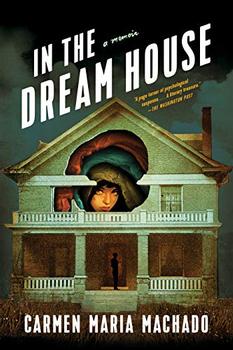Summary | Excerpt | Reviews | Beyond the Book | Readalikes | Genres & Themes | Author Bio

The memoir is, at its core, an act of resurrection. Memoirists re-create the past, reconstruct dialogue. They summon meaning from events that have long been dormant. They braid the clays of memory and essay and fact and perception together, smash them into a ball, roll them flat. They manipulate time; resuscitate the dead. They put themselves, and others, into necessary context.
I enter into the archive that domestic abuse between partners who share a gender identity is both possible and not uncommon, and that it can look something like this. I speak into the silence. I toss the stone of my story into a vast crevice; measure the emptiness by its small sound.
I
Eros limbslackener shakes me again—
that sweet, bitter, impossible creature.
Dream House as Not a Metaphor
I daresay you have heard of the Dream House? It is, as you know, a real place. It stands upright. It is next to a forest and at the rim of a sward. It has a foundation, though rumors of the dead buried within it are, almost certainly, a fiction. There used to be a swing dangling from a tree branch but now it's just a rope, with a single knot swaying in the wind. You may have heard stories about the landlord, but I assure you they are untrue. After all, the landlord is not a man but an entire university. A tiny city of landlords! Can you imagine?
Most of your assumptions are correct: it has floors and walls and windows and a roof. If you are assuming there are two bedrooms, you are both right and wrong. Who is to say that there are only two bedrooms? Every room can be a bedroom: you only need a bed, or not even that. You only need to sleep there. The inhabitant gives the room its purpose. Your actions are mightier than any architect's intentions.
I bring this up because it is important to remember that the Dream House is real. It is as real as the book you are holding in your hands, though significantly less terrifying. If I cared to, I could give you its address, and you could drive there in your own car and sit in front of that Dream House and try to imagine the things that have happened inside. I wouldn't recommend it. But you could. No one would stop you.
Dream House as Picaresque
Before I met the woman from the Dream House, I lived in a tiny two-bedroom in Iowa City. The house was a mess: owned by a slumlord, slowly falling apart, full of eclectic, nightmarish details. There was a room in the basement—my roommates and I called it the murder room—with blood-red floors, walls, and ceiling, further improved by a secret hatch and a nonfunctional landline phone. Elsewhere in the basement, a Lovecraftian heating system reached long tentacles up into the rest of the house. When it was humid, the front door swelled in its frame and refused to open, like a punched eye. The yard was huge and pocked with a fire pit and edged with poison ivy, trees, a rotting fence.
I lived with John and Laura and their cat, Tokyo. They were a couple; long-legged and pale, erstwhile Floridians who'd gone to hippie college together and had come to Iowa for their respective graduate degrees. The living embodiment of Florida camp and eccentricity, and, ultimately, the only thing that, post–Dream House, would keep the state in my good graces.
Laura looked like an old-fashioned movie star: wide-eyed and ethereal. She was dry and disdainful and wickedly funny; she wrote poetry and was pursuing a degree in library science. She felt like a librarian, like the wise conduit for public knowledge, as if she could lead you anywhere you needed to be. John, on the other hand, looked like a grunge rocker-cum-offbeat-professor who'd discovered God. He made kimchi and sauerkraut in huge mason jars he monitored on the kitchen counter like a mad botanist; he once spent an hour describing the plot of Against Nature to me in exquisite detail, including his favorite scene, in which the eccentric and vile antihero encrusts a tortoise's shell with exotic jewels and the poor creature, "unable to support the dazzling luxury imposed on it," dies from the weight. When I first met John, he said to me, "I got a tattoo, do you want to see?" And I said, "Yes," and he said, "Okay, it's gonna look like I'm showing you my junk but I'm not, I swear," and when he lifted the leg of his shorts high on his thigh there was a stick-and-poke tattoo of an upside-down church. "Is that an upside-down church?" I asked, and he smiled and wiggled his eyebrows—not lasciviously, but with genuine mischief—and said, "Upside down according to who?" Once, when Laura came out of their bedroom in cutoffs and a bikini top, John looked at her with real, uncomplicated love and said, "Girl, I want to dig you a watering hole."
Excerpt from In the Dream House . Copyright © 2019 by Carmen Maria Machado. Reprinted with the permission of Graywolf Press, Minneapolis, Minnesota, www.graywolfpress.org.
Your guide toexceptional books
BookBrowse seeks out and recommends the best in contemporary fiction and nonfiction—books that not only engage and entertain but also deepen our understanding of ourselves and the world around us.